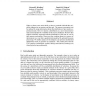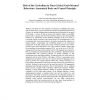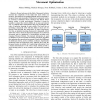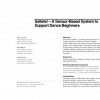69 search results - page 10 / 14 » Policy Learning for Motor Skills |
NIPS
2003
13 years 9 months ago
2003
When we learn a new motor skill, we have to contend with both the variability inherent in our sensors and the task. The sensory uncertainty can be reduced by using information abo...
NEUROSCIENCE
2001
Springer
14 years 8 days ago
2001
Springer
The Brain is a slow computer yet humans can skillfully play games such as tennis where very fast reactions are required. Of particular interest is the evidence for strategic thinki...
ICRA
2009
IEEE
14 years 2 months ago
2009
IEEE
— Recent advances in the field of humanoid robotics increase the complexity of the tasks that such robots can perform. This makes it increasingly difficult and inconvenient to ...
CHI
2009
ACM
14 years 8 months ago
2009
ACM
We present Saltate!, a wireless prototype system to support beginners of ballroom dancing. Saltate! acquires data from force sensors mounted under the dancers' feet, detects ...
DAGSTUHL
2003
13 years 9 months ago
2003
The study of how infants strapped in a Jolly Jumper learn to bounce can help clarify how they explore different ways of exploiting the dynamics of their movements. In this paper, ...




